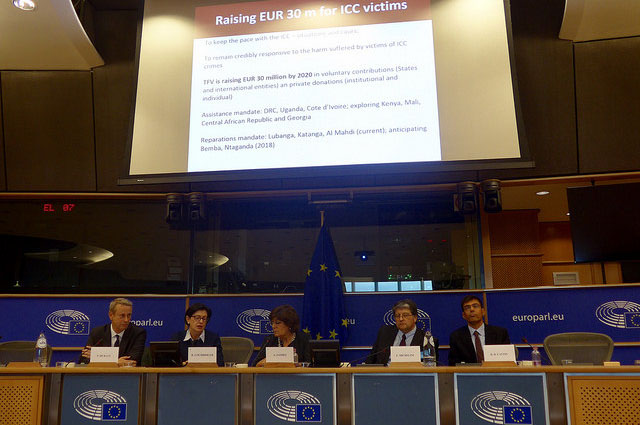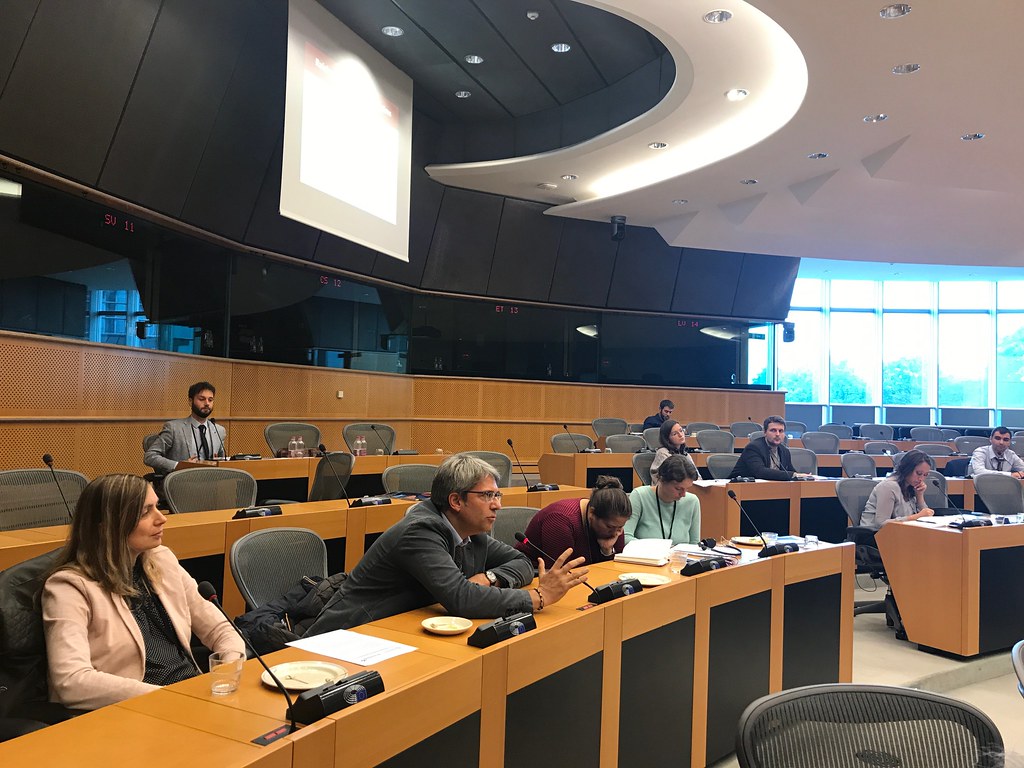
Brussels, 28 September 2017
On 28th September 2017, Parliamentarians for Global Action (PGA) organized a strategic discussion on how the support for the Trust Fund for Victims (TFV) at the International Criminal Court (ICC) can be integrated into a Corporate Social Responsibility (CSR) Strategy of private companies. The event was hosted by the chair of the PGA European Parliamentary Group, Ms. Ana Maria Gomes, MEP, and attended by members of the European Parliament, European Commission, EU’s European External Action Service and other institutions, a Board Member and the Executive Director of the TFV, members of the corporate and philanthropic communities and non-governmental organisations.
The event enabled for the opportunity to introduce at the European Parliament the mandate and achievements of the TFV, which aim at achieving long-lasting peace and reparative justice through assistance and reparations for victims. As of today, more than 454,000 individuals and families affected by atrocities in northern Uganda and Democratic Republic of Congo have benefitted from the TFV by having been provided with crucial physical, psychological, and material support. In the near future, the TFV aims to further expand its assistance to six countries and to fulfil its obligations to provide reparations to mass atrocities adjudicated by the Court.
In light of the progressing expansion of the TFV`s mandate aimed at providing reparation and assistance for a wide and diverse array of victims, panellists and participants agreed that donations by private entities to the TFV should be pro-actively encouraged as a meaningful exercise of their CSR strategies, hence broadening the TFV`s funding base beyond a predominant reliance on governmental support.

The prominent panel of speakers consisted of Ms. Ana Gomes, MEP (Portugal), PGA`s European Parliament Group chair; Ms. Barbara Lochbihler, MEP (Germany), Vice-Chair of the Human Rights Sub-Committee and PGA Board member; Dr. Felipe Michelini, TFV Board Member, Head of Delegation of Uruguay of “la Comisión Administradora del Río de la Plata” and member of the Commission for Justice and Reconciliation of Uruguay; Mr. Pieter de Baan, Executive Director of the TFV and Dr. David Donat Cattin, Secretary-General of PGA.
Mr. Pieter de Baan explained the assistance and reparations mandate of the TFV and provided an overview of the TFV projects aimed to help victim survivors to lead a dignified life and envision a better future. His speech was accompanied by a powerful power point presentation, which demonstrated to all participants the concrete results of the aid provided by TFV, which includes individual corrective surgeries or provisions of orthopaedic devices, as well as collective projects which benefit the communities as whole, e.g. initiatives to improve economic self-reliance of survivors and job-trainings and educational opportunities for their children.
Dr. Felipe Michelini continued highlighting the relevance and importance of the judgments of the ICC relating to reparations to victims. He noted that the decisions of the ICC on victims’ reparations have been largely based on the jurisprudence by Inter-American Court on Human Rights, guided by the principle that harm caused must be accompanied by due reparation to the victim. Dr. Michelini emphasized the role of victims’ centred justice in the Rome Statute system, and appealed to the European Parliament and all participants to find the best possible ways, strategies and means in support of the Trust Fund for Victims.
Dr. David Donat Cattin highlighted that so far approximately 22,000 victims have applied to participate in the ICC proceedings and almost all of them submitted requests for reparations, demonstrating their belief in the system of justice established by the Rome Statute. While expressing surprise that up to these days, no contribution from private entity had been received by the TFV, he stressed that the capacity of the Trust Fund to ensure that survivors of the gravest human rights violations are enabled to live a life of hope, dignity and respect, strongly depends on its ability to develop and maintain its resource base.
Ms. Ana Gomes, MEP, moderated the session with great energy, and expressed the firm belief that “The Trust Fund for Victims, together with the European Parliament and with the support of all relevant stakeholders including PGA, can make a difference in lives of victims of atrocities. Together we need to do our utmost to help them obtain justice, including the reparations they deserve. Reparations and assistance-measures they urgently and desperately need will contribute to regaining their dignity and rebuilding their lives, which have been severely affected by conflicts and crimes they had suffered.”
Ms. Barbara Lochbihler, MEP, gave a forceful speech from the perspective of victims, emphasizing that the right to apply for reparation is a fundamental component of sustainable justice in the context of societies that have been affected by atrocities, including post-conflict recovery. These reparations and assistance offered by TFV therefore contribute to the realization of sustainable and long-lasting peace without violence through the promotion of restorative justice and reconciliation.
The interactive discussion that followed aimed at exploring possible strategies to fundraise globally and potential cooperation between diverse stakeholders. The European Commission`s representative raised the idea of the opportunity for the Trust Fund to obtain direct support and funding from the EU through cooperation with EU Institutions in the sector of development or external action, with possible reference to country-specific EU interventions in which the support for victims may be an appropriate stabilization and conflict-recovery measure in the context of a fragile State. A legal expert from the European Commission emphasized the potential for cooperation with regard to African countries where the TFV is active, given the EU`s active involvement in Africa through initiatives such as the "Migration Compact" and Kimberly Process on “blood diamonds”, as well as interactions with the European Bank for Reconstruction and Development and national or regional financial institutions.
During the course of a highly interactive session, Ms. Ana Gomes, MEP, made a moving tribute to the unforgotten legacy of professor Cherif Bassiouni, a founding father of International Criminal Justice, who passed away just three days before this event at the European Parliament and who received from the PGA Board the Defender of Democracy Award in 1998. PGA’s Secretary-General Donat Cattin stressed that “thanks to the Bassiouni-van Boven principles, unanimously adopted by the UN General Assembly in 2005, the world’s community knows what are the ‘Basic Principles and Guidelines on the Right to a Remedy and Reparation for Victims of Gross Violations of International Human Rights Law and Serious Violations of International Humanitarian Law’. And professor Bassiouni taught us that the rights of the victims will be fulfilled only if States and all relevant stakeholders will honour their responsibilities.”
The Strategic session concluded by calling for the full support of private sector entities towards the TFV. There can be natural synergies between the needs of the Trust Fund for Victims and the concept of Corporate Social Responsibility if applied to concrete cases of victimization. One the guiding principles of the Corporate Social Responsibility is the integration of human rights into business operations whereas the fulfilment of basic human rights is at the heart of the mandate of the TFV. Therefore, investing in the Trust Fund for Victims represents one of the most meaningful ways to exercise Corporate Social Responsibility. Contributions from the private sector would enable the TFV to help thousands of victims of rape, torture, enslavement, murder, extermination, and other inhumane acts, while helping to rebuild communities affected by international crimes, which represents a fundamental component of sustainable justice. Such donations and contributions would express a powerful demonstration by relevant companies of their concern for human rights and commitment to achieving a positive impact on society.
Points of Action
PGA encourages the EU to call upon to invite the Trust Fund for Victims at the ICC to present its mandate, in order to acquaint themselves with the achievements of the TFV and consider how they can support the TFV in providing justice to victims and to achieve long-lasting peace. By investing into the TFV, the donors not only contribute significantly to providing justice to victims, but also play a major role in achieving long-lasting peace and preventing conflict recurrence.
PGA, strongly welcoming the European External Action Service input, calls upon EEAS to include TFV as a partner under relevant initiatives and instruments, starting with the Instrument contributing to Stability and Peace within pertinent country-specific strategies, e.g. in Central African Republic, Côte d`Ivoire and Mali. The assistance provided by TFV could significantly contribute to the sustainability of efforts for post-conflict stabilization and conflict prevention in these countries. This derives from the fact that if victims of mass atrocities do not receive proper access to justice, truth and reparations they may an incentive to take “justice” in their own hands. As a result, the repeated cycles of violence and retaliation may impede durable processes of stabilization and civilized coexistence.
